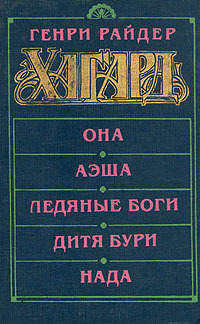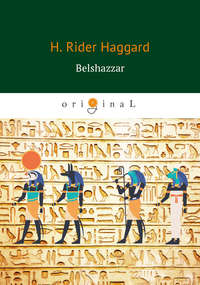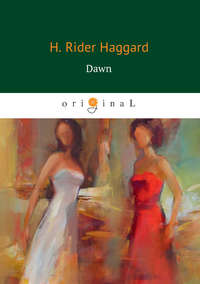
Полная версия
Allan and the Ice-Gods
The dogcart came round – indeed, it was already waiting – and thus this remarkable interview ended. From the door step I watched the departure of Mr. Mellis and saw him turn, look at me, and shake his head solemnly. Evidently he thought that the right place for me was a lunatic asylum.
“Thank goodness, that’s done with!” I said to myself. “Now I’ll order a trap and go and tell Curtis and Good about all the business. No, I won’t; they’ll only think me mad as that lawyer does, and argue with me. I’ll take a walk and mark those oaks that have to come down next spring. But first I had better put away these papers.”
Thus I reflected and began to collect the documents. Lifting the copy of the will, I saw lying beneath it the sealed letter of which Mr. Mellis had spoken, addressed to me and marked To be delivered after my death, or in the event of Mr. Quatermain pre-deceasing me, to be burned unread.
The sight of that well-known writing and the thought that she who penned it was now departed from the world and that nevermore would my eyes behold her, moved me. I laid the letter down, then took it up again, broke the seal, seated myself, and read as follows:
My dear friend, my dearest friend, for so I may call you, knowing as I do that if ever you see these words we shall no longer be fellow citizens of the world. They are true words, be cause between you and me there is a closer tie than you imagine, at any rate, at present. You thought our Egyptian vision to be a dream – no more; I believe it, on the other hand, at least in essentials, to be a record of facts that have happened in by gone ages. Moreover, I will tell you now that my revelation went further than your own. Shabaka and Amada were married and I saw them as man and wife leading a host southward to found a new empire somewhere in Central Africa, of which per chance the Kendah tribe were the last remnant. Then the darkness fell.
Moreover, I am certain that this was not the first time that we had been associated upon the earth, as I am almost certain that it will not be the last. This mystery I cannot understand or explain, yet it is so. In some of our manifold existences we have been bound together by the bonds of destiny, as in some we may have been bound to others, and so, I suppose, it will continue to happen, perhaps for ever and ever.
Now, as I know that you hate long letters, I will tell you why I write. I am going to make a will, leaving you practically everything I possess – which is a great deal. As there is no relationship or other tie between us, this may seem a strange thing to do, but after all, why not? I am alone in the world, without a relative of any kind. Nor had my late husband any except some distant cousins, those Atterby-Smiths whom you may remember, and these he detested even more than I do, which is saying much. On one point I am determined – that they shall never inherit, and that is why I make this will in such a hurry, having just received a warning that my own life may not be much prolonged.
Now, I do not deceive myself. I know you to be no money-hunter and I think it highly probable that you will shrink from the responsibilities of this fortune which, if it came to you, you would feel it your duty to administer it for the good of many to the weariness of your own flesh and spirit. Nor would you like the gossip in which it would involve you, or the worry of the actions-at-law which the Atterby-Smiths, and perhaps others unknown, would certainly bring against you. Therefore, it seems possible that you will refuse my gift, a contingency for which I have provided by alternative depositions. If a widowed lady without connections chooses to dispose of her goods in charity or for the advancement of science, etc., no one can complain. But even in this event I warn you that you will not al together escape, since I am making you my soul executor, and although I have jotted down a list of the institutions which I propose to benefit, you will be given an absolute discretion concerning them with power to vary the amounts, and add to, or lessen, their number. In return for this trouble, should you yourself renounce the inheritance, I am leaving you an executor’s fee of 5,000 pounds, which I beg that you will not renounce, as the mere thought of your doing so offends me. Also, as a personal gift, I ask you to accept all that famous set of Caroline silver which was used on grand occasions at Ragnall, that I remember you admired so much, and any other objects of art that you may choose.
Lastly – and this is the really important thing – together with the Egyptian collection, I pass on to you the chest of Taduki herb with the Kendah brazier, etc., enjoining you most strictly, if ever you held me in any friendship, to take it, and above all to keep it sacred.
In this, Friend, you will not fail me. Observe, I do not direct you to make further experiments with the Taduki. To begin with, it is unnecessary, since, although you have recently refused to do so in my company – perhaps because you were afraid of complications – sooner or later you will certainly breathe it by yourself, knowing that it would please me much, and, perhaps, when I am dead, hoping that through it you may see more of me than you did when I was alive. You know the dead often increase in value at compound interest, and I am vain enough to hope that this may be so in my case.
I have no more to say. Farewell – for a little while.
Luna Ragnall.
P.S. You can burn this letter if you like; it does not in the least matter, as you will never forget its contents. How interesting it will be to talk it over with you one day.
Chapter 2
Back to the Past
It is unnecessary that I should set out the history of the disposal of the great Ragnall fortune in any detail. I adhered to my decision which at last was recorded with much formality; though, as I was a totally unknown individual, few took any interest in the matter. Those who came to hear of it for the most part set me down as mad; indeed, I could see that even my friends and neighbours, Sir Henry Curtis and Captain Good, with whom I declined to discuss the business, more or less shared this view, while a society journal of the lower sort printed a paragraph headed:
THE HUNTER HERMIT. IVORY TRADER WHO MOCKED AT MILLIONS!
Then followed a distorted version of the facts. Also I received anonymous letters written, I do not doubt, by members of the Atterby-Smith family, which set down my self-denial to “the workings of a guilty conscience” and “to fears of exposure.”
Of all these things I took no heed, and notwithstanding wild threats of action by Mr. Atterby-Smith, in due course the alternative clauses of the will came into operation, under which, with only a rough list to guide me, I found myself the practical dispenser of vast sums. Then indeed I “endured hardness.” Not only had collieries and other properties to be sold to the best advantage, not only was I afflicted by constant interviews with Messrs. Mellis & Mellis and troubles too numerous to mention. In addition to these, I think that every society and charity in the United Kingdom and quite eighty per cent. of its beggars must have written or sought interviews with me to urge their public or private claims, so that, in the end, I was obliged to fly away and hide myself, leaving the lawyers to deal with the correspondence and the mendicants.
At length I completed my list, allotting the bulk of the money to learned societies, especially such of them as dealt with archaeological matters in which the testatrix and her husband had been interested; to those who laboured among the poor; to the restoration of an abbey in which I had heard Lady Ragnall express great interest, and to the endowment of the castle as a local hospital in accordance with her wish.
This division having been approved and ratified by an order in Court, my duties came to an end. Further, my fee as executor was paid me, which I took without scruple, for seldom has money been harder earned, and the magnificent service of ancient plate was handed over to me – or rather to the custody of my bank – with the result that I have never set eyes upon it from that day to this, and probably never shall.
Also, I selected certain souvenirs, including a beautiful portrait of Lady Ragnall by a noted artist, painted before her marriage, concerning which there was a tragic story whereof I have written elsewhere. This picture I hung in my dining room where I can see it as I sit at table, so that never a day passes that I do not think twice or thrice of her whose young loveliness it represents. Indeed, I think of her so much that often I wish I had placed it somewhere else.
The Egyptian collection I gave to a museum which I will not name; only the chest of Taduki and the other articles connected with it I kept, as I was bound to do, hiding them away in a bookcase in my study and hoping that I should forget where I had put them, an effort wherein I failed entirely. Indeed, that chest might have been alive to judge from the persistence with which it inflicted itself upon my mind, just as if someone were imprisoned in the bookcase. It was stowed away in the bottom part of an old Chippendale bookcase which stood exactly behind my writing chair and which I had taken over as a fixture when I bought the Grange. Now this chair, that I am using at the moment of writing, is one of the sort that revolves, and, heedless of the work I had to do, continually I found myself turning it round so that I sat staring at the bookcase instead of at my desk.
This went on for some days, until I began to wonder whether there was anything wrong; whether, for instance, I had placed the articles so that they could fall over and my subconscious self was reminding me of the fact. At length, one evening after dinner, this idea fidgeted me so much that I could bear it no more. Going to my bedroom, I opened the little safe that stands there and took out the key of the bookcase which I had stowed away so that I could not get at it without some trouble. Returning, I unlocked the faded mahogany door of the Eighteenth Century bookcase and was surprised when it opened itself very quickly, as if something were pushing at it.
Next moment, I saw the reason. My subconscious self had been right. Owing, I suppose, to insufficient light when I put them away, I had set the ebony tripod upon which rested the black stone bowl that formerly was used in the Taduki ceremonies in the sanctuary of the temple in Kendah-land, whence Lady Ragnall had brought it, so that one of its feet projected over the edge of the shelf. Thus it pressed against the door, and when it was opened, of course fell forward. I caught it, rather smartly, I flattered myself, or rather I caught the bowl, which was very heavy, and the tripod fell to the floor. Setting down the bowl on the hearthrug which was near, I picked up its stand and made a hasty examination, fearing lest the brittle, short-grained wood should have broken. It had not; its condition was as perfect as when it was first used, perhaps thousands of years before.
Next, that I might examine this curiosity with more care than I had ever yet done, I placed the bowl upon its stand to con sider its shape and ornamentation. Though so massive, I saw that in its way it was a beautiful thing, and the heads of the women carved upon the handles were so full of life that I think they must have been modelled from a living person. Perhaps that model was the priestess who had first used it in her sacred rites of offering or of divination, or perhaps Amada herself, to whom, now that I thought of it, the resemblance was great, as I had seen her in my Taduki dream.
The eyes (for both handles were identical) seemed fixed on me in a solemn and mystical stare; the parted lips looked as though they were uttering words of invitation. To what did they invite? Alas! I knew too well: it was that I should burn Taduki in the bowl so that they might be opened by its magic and tell me of hidden things.
Nonsense! I thought to myself. Moreover, I remembered that one must never take Taduki after drinking wine. Then I re membered something else; namely, that, as it happened, at dinner that night I had drunk nothing but water, having for some reason or other preferred it to claret or port. Also, I had eaten precious little – I suppose because I was not hungry. Or could it be that I was a humbug and had done these things, or rather left them undone, so that should temptation overtake me its results might not prove fatal? Upon my word, I did not know, for on such occasions it is difficult to disentangle the exact motives of the heart.
Moreover, this speculation was forgotten in a new and convincing idea that suddenly I conceived. Doubtless, the virtues, or the vices, of Taduki were all humbug, or rather nonexistent. What caused the illusions was the magnetic personalities of the ministrants, that is to say, of Lady Ragnall herself and, on my first acquaintance with it, here in England, of that remarkable old medicine man, Harut. Without these personalities, and especially the first who was now departed from the earth, it would be as harmless as tobacco and as ineffectual as hay. So delighted was I with this discovery that almost I determined to prove it by immediate demonstration.
I opened the carved chest of rich-coloured wood and drew out the age-blackened silver box within which now I observed for the first time had engraved upon it several times a picture of the goddess Isis in her accustomed ceremonial dress, and a god, Osiris or Ptah, I think, making incantations with their hands, holding lotus flowers and the Cross of Life stretched out over a little altar. This I opened also, whereon a well-remembered aroma arose and for a moment clouded my senses. When these cleared again, I perceived, lying on the top of the bundles of Taduki leaves, of which there seemed to be a large quantity remaining, a half sheet of letter paper bearing a few lines in Lady Ragnall’s handwriting.
I lifted it and read as follows:
My Friend:
When you are moved to inhale this Taduki, as certainly you will do, be careful not to use too much lest you should wander so far that you can return no more. One of the little bundles, of which I think there are thirteen remaining in the box, should be sufficient, though perhaps as you grow accustomed to the drug you may require a larger dose. Another thing – for a hid den reason with which I will not trouble you, it is desirable, though not necessary, that you should have a companion in the adventure. By preference, this companion should be a woman, but a man will serve if he be one in whom you have confidence and who is sympathetic to you. L.R.
“That settles it,” I thought. “I am not going to take Taduki with one of the housemaids, and there is no other woman about here,” and I rose from my chair, preparing to put the stuff away.
At that moment, the door opened and in walked Captain Good.
“Hullo, old fellow,” he said. “Curtis says a farmer tells him that a lot of snipe have come in onto the Brathal marshes, and he wants to know if you will come over to-morrow morning and have a go at them – I say, what is this smell in the room? Have you taken to scented cigarettes or hashish?”
“Not quite, but, to tell you the truth, I was thinking of it,” I answered, and I pointed to the open silver box.
Good, who is a person of alert mind and one very full of curiosity, advanced, sniffed at the Taduki, and examined the brazier and the box, which in his ignorance he supposed to be of Grecian workmanship. Finally, he overwhelmed me with so many questions that, at length, in self-defence, I told him something of its story and how it had been bequeathed to me with its contents by Lady Ragnall.
“Indeed!” said Good. “She who left you the fortune which you wouldn’t take, being the lineal descendant of Don Quixote, or rather of Sancho Panza’s donkey. Well, this is much more exciting than money. What happened to you when you went into that trance?”
“Oh!” I answered wearily, “I seemed to foregather with a very pretty lady who lived some thousands of years ago, and after many adventures, was just about to marry her when I woke up.”
“How jolly! though I suppose you have been suffering from blighted affections ever since. Perhaps, if you took some more, you might pull it off next time.”
I shook my head and handed him the note of instructions that I had found with the Taduki, which he read with attention, and said:
“I see, Allan, that a partner is required and that failing a lady, a man in whom you have confidence and who is sympathetic to you, will serve. Obviously that’s me, for in whom could you have greater confidence, and who is more sympathetic to you? Well, my boy, if there’s any hope of adventures, real or imaginary, I’ll take the risk and sacrifice myself upon the altar of friendship. Light up your stuff – I’m ready. What do you say? That I can’t because I have been dining and drinking wine or whisky? Well, as a matter of fact, I haven’t. I’ve only had some tea and a boiled egg – I won’t stop to explain why – and intended to raise something more substantial out of you. So fire away and let’s go to meet your lovely lady in ancient Egypt or anywhere else.”
“Look here, Good,” I explained, “I think there is a certain amount of risk about this stuff, and really you had better reflect”
“Before I rush in where angels fear to tread, eh? Well, you’ve done it and you ain’t even an angel. Also I like risks or anything that makes a change in this mill round of a life. Come on. What have we got to do?”
Then, feeling that Fate was at work, under a return of the impulse of which the strength had been broken for a moment by the reading of Lady Ragnall’s note of instructions, I gave way. To tell the truth, Good’s unexpected arrival when such a companion was essential, and his strange willingness, and even de sire, to share in this unusual enterprise, brought on one of the fits of fatalism from which I suffer at times. I became convinced that the whole business was arranged by something or somebody beyond my ken – that I must take this drug with Good as my companion. So, as I have said, I gave way and made the necessary preparations, explaining everything to Good as I did so.
“I say!” he said at last, just as I was fishing for an ember from the wood fire to lay upon the Taduki in the bowl, “I thought this job was a joke, but you seem jolly solemn about it, Allan. Do you really think it dangerous?”
“Yes, I do, but more to the spirit than to the body. I think, to judge from my own experience, that anyone who has once breathed Taduki will wish to do so again. Shall we give it up? It isn’t too late.”
“No,” answered Good. “I never funked anything yet, and I won’t begin now. ’Lay on, Macduff’!”
“So be it, Good. But first of all, listen to me. Move that armchair of yours close to mine, but not quite up against it. I am going to place the brazier just between and a little in front of us. When the stuff catches a blue flame will burn for about thirty seconds – at least, this happened on a previous occasion. So soon as it dies away and you see the smoke begin to rise, bend your head forward and a little sideways so that it strikes you full in the face, but in such a fashion that, when you become insensible, the weight of your body will cause you to fall back into the chair, not outward to the floor. It is quite easy if you are careful. Then open your mouth and draw the vapour down into your lungs. Two or three breaths will suffice, as it works very quickly.”
“Just like laughing gas,” remarked Good. “I only hope I shan’t wake with all my teeth out. The last time I took it I felt – “
“Stop joking,” I said, “for this is a serious matter.”
“A jolly sight too serious! Is there anything else?”
“No. That is, if there is anybody you particularly wish to see, you might concentrate your thoughts on him – “
“Him! I can’t think of any him, unless it is the navigating lieu tenant of my first ship, with whom I always want to have it out in the next world, as he is gone from this, the brute.”
“On her, then; I meant her.”
“Then why didn’t you say so instead of indulging in pharisaic al humbug? Who would breathe poison just to meet another man?”
“I would,” I replied firmly.
“That’s a lie,” muttered Good. “Hullo! don’t be in such a hurry with that coal, I ain’t ready. Ought I to say any hocus-pocus? Dash it all! it is like a nightmare about being hanged.”
“No,” I replied, as I dropped the ember onto the Taduki just as Lady Ragnall had done. “Now, play fair, Good,” I added, “for I don’t know what the effect of half a dose would be; it might drive you mad. Look, the flame is burning! Open your mouth and arrange your weight as I said, and when your head begins to whirl, lean back at the end of the third deep breath.”
The mysterious, billowy vapour arose as the pale blue flame died away, and spread itself out fanwise.
“Aye, aye, my hearty,” said Good, and thrust his face into it with such vigour that he brought his head into violent contact with mine, as I leant forward from the other side.
I heard him mutter some words that were better left unsaid, for often enough Good’s language would have borne editing. Then I heard no more and forgot that he existed.
My mind became wonderfully clear and I found myself arguing in a fashion that would have done credit to the greatest of the Greek philosophers upon all sorts of fundamental problems. All I can remember about that argument or lecture is that, in part at any rate, it dealt with the possibility of reincarnation, setting out the pros and cons in a most vivid manner.
Even if I had not forgotten them, these may be passed over, as they are familiar to students of such subjects. The end of the exposition, however, was to the effect that, accepted as it is by a quarter of the inhabitants of the earth, this doctrine should not lightly be set aside, seeing that in it there is hope for man; that it is at least worthy of consideration. If the sages who have preached it, from Plato down – and indeed for countless ages before his time, since without doubt he borrowed it from the East – are right, then at least we pure human creatures do not appear and die like gnats upon a summer’s eve, but in that seeming day pass on to life eternally renewed, climbing a kind of Jacob’s ladder to the skies.
It is true that as our foot leaves it, each rung of that ladder vanishes. Below is darkness and all the gulf of Time. Above is darkness and we know not what. Yet our hands cling to the uprights and our feet stand firm upon a rung, and we know that we do not fall, but mount; also that, in the nature of things, a ladder must lean against some support and lead somewhere. A melancholy business, this tread mill doctrine, it may be said, where one rung is so like another and there are so many of them. And yet, and yet – is it not better than that of the bubble which bursts and is gone? Aye, because life is better than death, especially if it be progressive life, and if at last it may lead to some joy undreamed, to some supernal light in which we shall see all the path that we have trodden, and with it the deep foundations of the Rock of Being upon which our ladder stands and the gates of Eternal Calm whereon it leans.
Thus, in the beginning of my dream state, I, the lecturer, argued to an unknown audience, or perhaps I was the audience and the lecturer argued to me, I am not sure, pointing out that otherwise we are but as those unhappy victims of the Revolution in the prisons of Paris, who for a little while bow and talk and play our part, waiting till the door opens and the jailer Death appears to lead us to the tumbril and the knife.
The argument, I should point out, was purely rational; it did not deal with faith, or any revealed religion, perhaps because these are too personal and too holy. It dealt only with the possible development of a mighty law, under the workings of which man, through much tribulation, might accomplish his own weal and at last come to look upon the source of that law and understand its purpose.
Obviously these imperfectly reported reflections, and many others that I cannot remember at all, were induced by the feeling that I might be about to plunge into some seeming state of former existence, as I had done once before under the influence of this herb. My late friend, Lady Ragnall, believed that state to be not seeming but real; while I, on the other hand, could not accept this as a fact. I set it down, as I am still inclined to do, to the workings of imagination, superexcited by a strange and powerful drug and drawing, perhaps, from some fount of knowledge of past events that is hidden deep in the being of every one of us.











